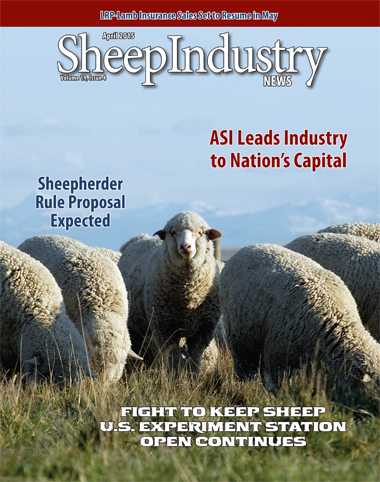
- April 2015
- President’s Notes
- ASI Takes Sheep Issues to D.C.
- ‘Let’s Grow’ Points to South Dakota Success
- Fight to Keep Sheep Station Open Continues
- Workshop Provides Insight to Fall Lambing
- ASI Joins Request to Fund Animal Sciences
- LRP-Lamb Expected to Be Made Available in May
- Market Report
- Nominations for Lamb Board Due May 1
- Sheepherder rule proposals are expected
- U.S. Forest Service Risk Assessment Study Could Borrow From Wyoming’s Sheep Plan
- News Briefs
- Classifieds April 2015
Sheepherder rule proposals are expected
ASI and sheep producers are keeping their collective eyes on an expected move by the U.S. Department of Labor on special labor provisions for open-range livestock herders.
The proposed rules are due out prior to April 15.
The provisions are included in the “special procedures” sub rules of the H-2A visa program that allow U.S. farmers and ranchers to hire temporary or seasonal foreign workers when they are unable to recruit enough U.S. workers. Loss of those provisions would be disastrous for open-range operations and would unravel a program that has worked well for decades, said Peter Orwick, ASI’s executive director.
More than 40 percent of U.S. sheep graze on federal and state lands in remote areas, and workers must be with the sheep at all times to move them and protect them from predators, Orwick said.
For ranchers, the potential changes by the Department of Labor could be harmful to their operations.
For example, the current minimum salary in Montana pays foreign workers under the H-2A visa program $750 a month, plus room and board. The changes would require a minimum hourly wage of $8.05.
“Our herder is on the mountain 24/7 and working on call, and he’d have to be paid 24 hours a day, plus 30 percent more for workman’s compensation,” Montana sheep rancher John Stahl said. “You’re looking at $7,200 a month.”
Current rules allows sheepherders to live in campers or wagons. But a proposed change would require workers to have housing on a foundation, “so they can’t be in moving wagons or campers anymore,” Stahl said, noting, “How’s that going to work on a mountain or out on the range with sheep?”
The change would mean it would take most of a day for workers to drive to and from remote areas from permanent housing, and operators couldn’t hire enough workers to be near the animals at all times.
The special procedures have always been informal guidelines and have never gone through the rule-making process, said Kelli Griffith, executive director of Mountain Plains Agriculture Service.
The special provisions are essential for livestock businesses operating on open range. The concern is that DOL will remove one or all of the critical provisions, which would eliminate a labor supply for open-range operations, she said.
The threat to the herder provisions originated when four former herders sued DOL in 2011 in federal district court, alleging the agency violated the Administrative Procedure Act. The herders challenged DOL’s 2011 adoption of two documents announcing special procedures governing certification of H-2A herder positions without rule-making, according to court documents.
The court dismissed the case in February of 2013 for lack of standing. The plaintiffs appealed, and the appeals court reversed the dismissal and directed DOL to put the herding special procedures through the rule-making process, Griffith said.

